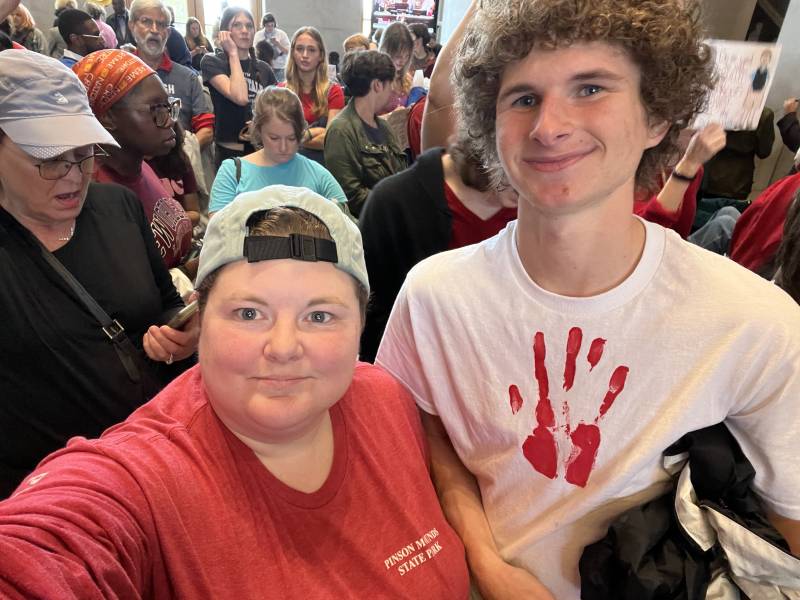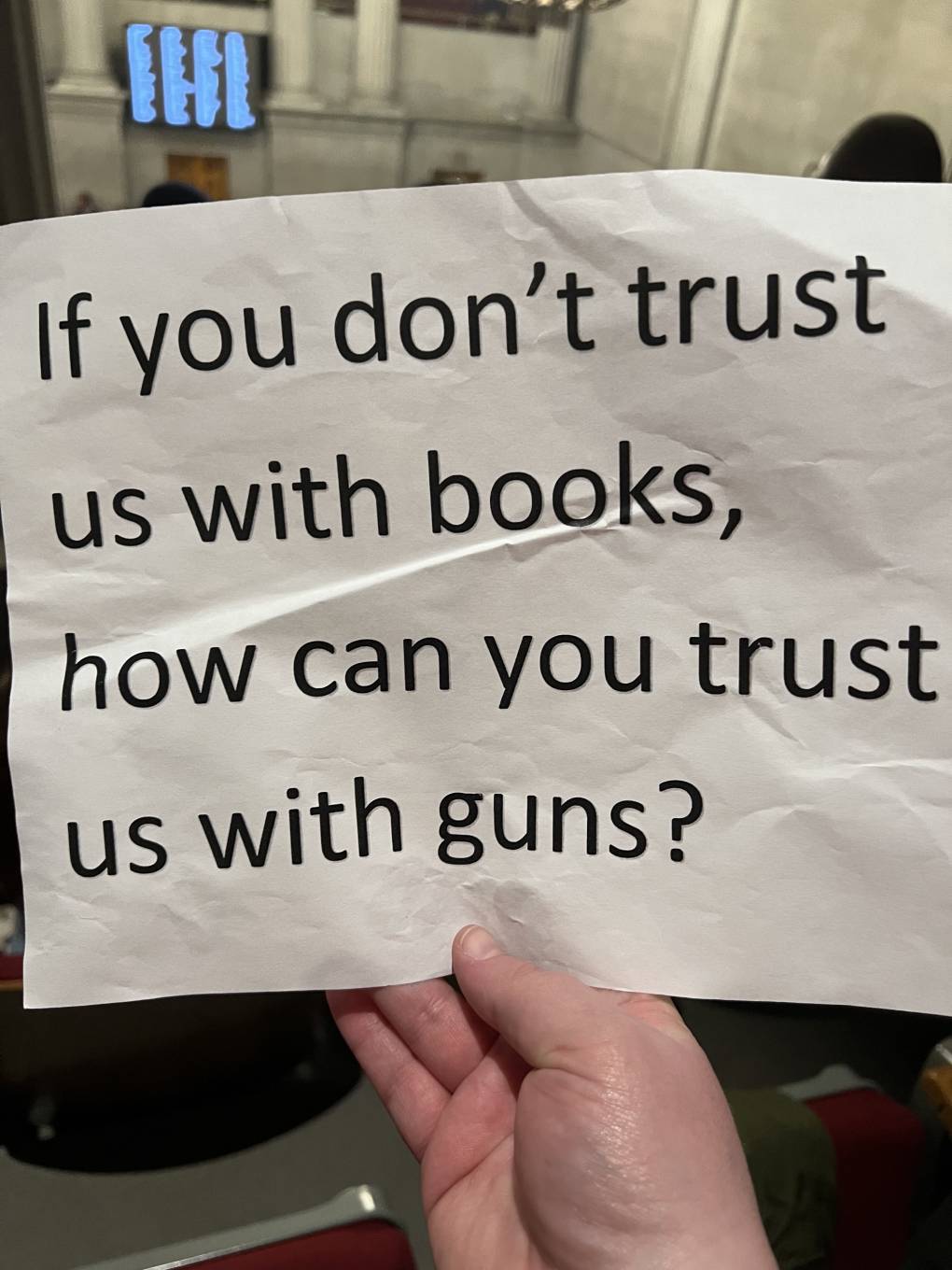This opinion column about the Tennessee expulsion was produced by The Hechinger Report, a nonprofit, independent news organization focused on inequality and innovation in education. Sign up for Hechinger’s weekly newsletters.
Activism has been part of Safiyah Suara’s young life since her politician mother hauled her along to demonstrations in a baby carrier. That’s why she’ll be spending this week protesting guns and the expulsion from the Tennessee House of two Democratic lawmakers by their Republican colleagues.
She’s hoping more young Tennesseans will join her.
“The most important thing is to keep speaking out, and to show the legislature and the rest of the world that we won’t stop fighting,” said Safiyah, an 18-year-old senior at Hume-Fogg, a magnet high school just four a few blocks from the state capitol.
Some 7,000 students who walked out of school in Nashville on April 3 did exactly that, after three children and three adults were killed by an assailant armed with semi-automatic weapons at a nearby church-affiliated school. They confronted lawmakers in the capitol, then later watched in dismay as a Republican majority ousted Rep. Justin Pearson and Rep. Justin Jones for interrupting debate by leading a gun control protest on March 30 inside the chamber.
On Sunday, the day before yet another mass shooting left five dead in Louisville, I spoke via Zoom with Safiyah and two of her Hume-Fogg classmates, along with their English teacher Courtney Shultz. They described what they see as an attack on democracy, one that has trained the nation’s eyes on their home state. Despite anguish over gun violence and the legislature’s failure to act on the issue, the high school seniors hope to build a better Tennessee, a state with a history of racism and segregation that only recently removed the bust of the first grand wizard of the Ku Klux Klan from the state capitol.
“Unfortunately, it’s up to our generation to push back and let them know we are not going to be silent anymore,” said Ren Peters, 18, who plans to study oceanography in college this fall in Florida, but wants to come back to his home state and continue fighting for stricter gun control. “We are going to be heard. You are not going to push us around. This isn’t a dictatorship.”
Shultz, who is also the school’s debate team coach, described the lesson in democracy she and about 25 Hume-Fogg students received last Thursday, when student government leaders from the school held a peaceful demonstration in support of Pearson and Jones in front of the capitol alongside their principal. Many waited in a packed tunnel for two hours to enter the building before they were confronted by state troopers who told them the building was full and they couldn’t enter, Schultz recalled.

The students carried small signs (after being warned they could not be larger than 8.5 x 11) with slogans like “Make Murder More Difficult,” and “We Just Want to Live Through High School.”
They led chants and songs, including the renowned gospel tune “This little light of mine.” Several said they have been angry at the lack of stricter gun control laws in Tennessee and elsewhere for years, along with their legislature’s more recent focus on banning books, abortion and drag shows.
“We have been repeatedly asked to be patient. At this point, patience is ignorance,” Hume-Fogg senior Wyatt Bassow wrote in a letter to Republican Tennessee Gov. Bill Lee, published in USA Today. “The reason this keeps happening is not drag shows or video games or a leftist agenda or books or schools or dress code or ‘wokeness’ or civil rights.”
Like Ren, Wyatt plans to attend college in Florida, but told me he sees a future for himself in Tennessee, perhaps in politics. He’s both outraged and energized by what he witnessed in the state capitol.
“This is fascism. We are looking at it straight in the face, and the first step to fascism is silence,” Wyatt told me. “That’s why I want to come back here and make havoc. I know I can make change, even though our democracy is fragile.”

Safiyah, a member of the mayor’s youth council, has more practice at protesting than her classmates Ren and Wyatt. She’s the daughter of at-large Metro Council member Zulfat Suara, who came to Tennessee the U.S. from Nigeria in 1993 and was with Vice President Kamala Harris when she visited Nashville on April 7 and told protestors: “Your voices are part of the conscience of our country.”
Safiyah has already led a rally to stop Republicans from changing part of a Tennessee street named for Georgia Democrat and civil rights icon Rep. John Lewis to Donald Trump Boulevard. She’s met members of Lewis’s family in Alabama, and knows both Jones and Pearson.
The ouster felt even more personal because Safiyah knows both men. The two legislators, both of whom are Black, were ousted while Rep. Gloria Jones, who is white and who also joined the protestors, was not. Collectively they’ve become known as “The Tennessee Three,” but only Jones and Pearson must now fight to get their positions back.
Once school is out today, Safiyah will head back to the state capitol in support of Jones and Pearson, where a special meeting of the city’s metro council will be held to discuss the vacant seats. She said she feels tired. But when Safiyah enters Rhodes College in Memphis next fall, she’ll continue fighting and protesting, making the kind of “good trouble” Rep. John Lewis personified.
“He would be sick to his stomach seeing everything that is happening,” Safiyah told me. “He’d be sad for the state of Tennessee.”
She’s certain that he would also be heartened by the voices of young students, pushing back, just as Safiyah was taught to do from the time she was born.
“My mom,” Safiya told me, “has always taught me that if you don’t have a seat at the table, full up a folding chair.”
This opinion column about the Tennessee expulsion was produced by The Hechinger Report, a nonprofit, independent news organization focused on inequality and innovation in education. Sign up for our weekly newsletters.